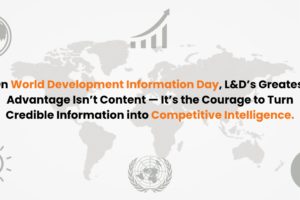
AI-Powered Agents Are Revolutionizing Corporate Training

Transforming Training Programs With Automation
In today’s fast-paced business environment, corporate Learning and Development (L&D) teams are facing an all-too-familiar challenge: how to deliver impactful training programs with limited resources. The pressure to upskill employees, ensure compliance, and foster a culture of continuous learning often clashes with tight budgets, small teams, and growing organizational demands.
Traditional L&D approaches, while foundational, often fall short in addressing the unique learning needs of employees at scale. Enter agentic AI—a game-changing technology that is redefining corporate training. By automating repetitive tasks, personalizing learning experiences, and enabling employees to take an active role in their own development, AI-powered agents are helping organizations do more with less. This article explores how agentic AI is transforming corporate training, the benefits it brings, and why organizations that adopt this technology now are likely to gain a competitive advantage in talent development.
In this article, you’ll find…
Understanding Agentic AI
Before diving into its applications in L&D, it’s important to understand what agentic AI is. AI-powered agents are intelligent, autonomous software programs capable of executing tasks independently, learning from data, and making decisions to optimize outcomes. Unlike traditional AI, which typically performs a single task (like recommending a course), agentic AI is goal-oriented, adaptive, and proactive. In corporate training, AI-powered agents can:
- Analyze employee performance and skills gaps.
- Curate personalized learning pathways.
- Deliver real-time feedback and coaching.
- Automate administrative and operational tasks.
- Track learning outcomes and provide actionable insights.
These capabilities allow AI agents to function not just as tools but as digital learning partners, actively guiding employees while reducing the operational burden on L&D teams.
The Challenges Of Traditional Corporate Training
Even well-resourced L&D teams face numerous challenges:
1. Manual Administrative Work
Coordinating training schedules, enrolling participants, tracking attendance, and generating reports consumes substantial time and energy. A significant portion of an L&D team’s workload often goes into administrative work rather than strategic initiatives.
2. Generic Content
Many traditional programs deliver a one-size-fits-all approach. Employees may be required to complete the same modules regardless of their role, prior knowledge, or skills level, leading to disengagement and wasted effort.
3. Slow Adoption And Engagement
Employees often view training as an obligation rather than an opportunity. Without personalized relevance or interactive content, engagement and knowledge retention suffer.
4. Limited Scalability
As organizations grow and workforces become distributed across geographies, scaling learning programs efficiently becomes a major challenge.
5. Difficulty Measuring Impact
Tracking ROI and the effectiveness of learning programs often requires manual data collection and analysis, making it difficult for leaders to justify training investments.
Agentic AI addresses these challenges by automating repetitive tasks, personalizing learning, and providing actionable insights, allowing L&D teams to focus on strategic initiatives that drive business impact.
How AI-Powered Agents Are Revolutionizing Corporate Training
1. Personalized Learning At Scale
One of the most powerful applications of agentic AI in L&D is its ability to deliver personalized learning experiences at scale. AI agents analyze employee data—such as past performance, skill assessments, and career aspirations—to design customized learning paths. Employees no longer need to navigate generic courses or irrelevant content. Instead, each individual receives training tailored to their unique needs, improving engagement, retention, and performance.
- Example
An AI agent identifies that a marketing associate needs advanced data analytics skills and automatically recommends a short course, assigns practice exercises, and tracks progress. As the employee completes modules, the AI adjusts recommendations to reflect emerging skills or new organizational priorities. - Impact
Personalized learning leads to higher completion rates, faster skill acquisition, and a workforce that is better prepared for evolving business demands.
2. Real-Time Feedback And Coaching
Traditional corporate training often relies on post-training surveys or manual assessments, which provide delayed insights. AI agents, however, offer instant feedback during the learning process, ensuring that employees correct mistakes, reinforce key concepts, and stay motivated.
- Example
During a compliance training module, an AI agent detects repeated errors in quiz responses. It dynamically provides additional resources, micro-lessons, or interactive simulations to help the learner improve. This just-in-time coaching helps employees learn faster, retain knowledge longer, and feel supported throughout their development journey.
3. Automation Of Administrative Tasks
From course enrollment to reporting, AI agents can handle routine L&D administration. This frees up human teams to focus on designing innovative programs, aligning learning with strategic goals, and supporting organizational growth.
- Example
An AI agent automatically enrolls new hires in onboarding programs, tracks completion, generates executive dashboards with learning metrics, and even sends reminders to ensure compliance deadlines are met. The result is a leaner, more efficient L&D operation that delivers measurable value without additional headcount.
4. Just-In-Time Microlearning
Modern employees are often busy, making long training sessions impractical. AI agents enable microlearning—short, focused, and contextual learning experiences that employees can access when needed.
- Example
A sales representative receives a two-minute refresher on objection handling just before a client call. Similarly, an engineer might access a quick troubleshooting guide while resolving a technical issue. By delivering learning at the point of need, AI agents improve retention, application of knowledge, and overall performance.
5. Enabling Citizen Development In L&D
Beyond facilitating learning, agentic AI empowers employees to become citizen developers, building their own training apps, dashboards, or workflows without extensive technical expertise. Low-code/no-code platforms, guided by AI agents, allow nontechnical staff to create:
- Onboarding trackers.
- Quiz generators.
- Knowledge-sharing platforms.
- Performance dashboards.
- Example
An HR associate designs a self-paced onboarding tracker for remote employees, while AI agents automatically update progress, recommend modules, and generate completion reports. This approach democratizes learning innovation, allowing employees to actively contribute to the L&D ecosystem and freeing L&D teams to focus on higher-value initiatives.
6. Predictive Learning And Skills Forecasting
AI-powered agents can analyze workforce data and industry trends to predict future skills requirements. This allows L&D teams to proactively prepare employees for upcoming business challenges rather than reactively filling skill gaps.
- Example
An AI agent identifies that digital marketing skills are becoming critical for the next year and recommends training programs for relevant employees. Predictive learning ensures organizations remain agile, competitive, and prepared for evolving market demands.
7. Data-Driven Insights For Leadership
Agentic AI generates actionable insights by tracking learning metrics, engagement levels, skill progression, and program effectiveness.
- Example
Executives can access dashboards showing:
- Completion rates by department.
- Skills acquired vs. skills needed.
- ROI of learning programs.
These insights enable leaders to make informed decisions, allocate resources efficiently, and demonstrate the business value of L&D initiatives.
Benefits Of AI-Powered Agents For Corporate Training
- Higher efficiency
Automating administrative tasks and optimizing learning paths allows teams to accomplish more with fewer resources. - Better engagement
Personalized and relevant content drives participation and motivation. - Accelerated skills development
Real-time feedback, just-in-time learning, and predictive insights speed up employee growth. - Scalability
AI agents can reach employees across geographies and roles, ensuring consistent learning experiences. - Cost savings
Reduced manual effort, better resource allocation, and faster skill acquisition lower training costs. - Innovation culture
Empowering employees as citizen developers encourages experimentation, creativity, and continuous improvement.
Real-World Examples
Several forward-thinking companies are already seeing the impact of agentic AI in L&D:
- Global tech firm
Reduced onboarding time for new hires by 40% using AI-guided learning paths and automated tracking. - Financial services organization
Enabled managers to receive real-time skill gap insights, resulting in faster upskilling and compliance achievement. - Retail enterprise
Implemented AI-powered microlearning modules delivered at the point of need, increasing sales training effectiveness by 30%.
These examples illustrate that AI-powered agents aren’t just a futuristic concept—they’re practical tools delivering measurable business outcomes today.
The Future Of Corporate Training
Agentic AI is transforming corporate training from a reactive, administrative function to a strategic growth engine. The next-generation L&D team will focus on:
- Designing innovative programs rather than managing spreadsheets.
- Leveraging AI insights for proactive skills development.
- Empowering employees to create learning solutions.
- Fostering continuous learning and a culture of innovation.
Organizations that adopt agentic AI now will gain a competitive edge in talent development, employee engagement, and overall performance.
Conclusion
Corporate training is no longer just about delivering content. It’s about creating personalized, scalable, and actionable learning experiences. AI agents make this possible by:
- Automating administrative tasks.
- Personalizing learning journeys.
- Delivering real-time coaching.
- Enabling citizen development.
- Generating actionable insights.
The result is an L&D function that does more with less, employees who learn smarter and faster, and organizations that remain agile and competitive. Agentic AI isn’t just changing corporate training—it’s revolutionizing it. The question is not if your organization should adopt AI-powered agents, but how quickly you can integrate them to maximize learning impact.
Source link



